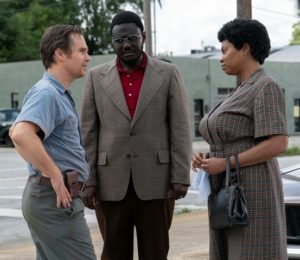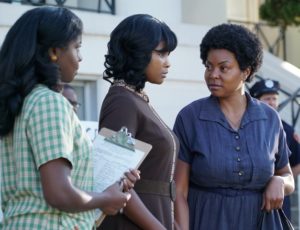
ORLANDO, FL (ANS) What happens when you assign a Ku Klux Klan president and a Black civil rights activist – in the racially charged 1971 U.S. South – to collaborate on school desegregation? Shouting? Threats? Violence? Murder?
Fasten your seatbelts for a wild ride that few back then could have predicted.
C.P. Ellis, a Duke University maintenance worker, served as Grand Cyclops of the Durham, North Carolina, Klan. Ann Atwater was a local Black civil rights activist with an attitude. The Best of Enemies movie tells their compelling story of transforming hostility into a powerful alliance.
The cast includes Academy Award® nominee Taraji P. Henson (Hidden Figures) and Academy Award® winner Sam Rockwell (Three Billboards Outside Ebbing, Missouri), plus Wes Bentley (The Hunger Games), Anne Heche (Wag the Dog), and Nick Searcy (The Shape of Water).

Photo Credit: Annette Brown.
Motion Picture Artwork © 2018 STX Financing, LLC.
All Rights Reserved.
Guns, knives and Bibles
Ellis and Atwater co-chaired a ten-day community school-desegregation forum.
Ellis sought to thwart integration efforts, Atwater explained. But, she told NPR, “God had a hand on that….C.P. had a machine gun” that he displayed daily, but “I had my white Bible in my hand. So I told C.P. we would see whose God would be the strongest, my God or his God. I always said if they’d said something to me, I was going to knock the hell out of them with my Bible.”
Earlier, Atwater, knife in hand, had nearly killed the verbally abusive Ellis, but her pastor stopped her.
“I hated her guts,” admitted Ellis. “I hated him just as hard as he hated me,” Atwater affirmed.

Credit: Annette Brown. Courtesy of STXfilms.
Motion Picture Artwork © 2018 STX Financing, LLC.
All Rights Reserved.
New birth
So what happened? A Gospel choir entertained. Ellis clapped to the music, but not in time, so Atwater taught him to clap. Speaking with suffering children softened their animosity. Recalled Atwater, “Me and him cried at that time, and we began to melt down towards one another.”
At the final session, Ellis admitted, “Something has happened to me, and I think it’s for the best…. I used to think that Ann Atwater was the meanest black woman I’d ever seen in my life. … But, you know, her and I got together…..”
What fueled their change? Atwater wrote in the Durham Herald-Sun, “In church the preacher says that if you want to be like Jesus you must be ‘born again.’ That really is the only way I can describe it. Something came into our lives…. The blinders came off and we…saw how much we had in common. Then we couldn’t imagine not being friends.”

Credit: Annette Brown.
Courtesy of STXfilms. Motion Picture Artwork © 2018 STX Financing, LLC.
All Rights Reserved.
Forgiveness
“But we couldn’t be friends without forgiving one another. …There is no future without forgiveness. …our hate had to die… C.P. showed me that people can learn to love. We really can be born again….”
Atwater maintained Ellis “changed from a Klansman to a Christian.” She believed a divine hand was at work, remained Ellis’ friend, and spoke at his funeral.
The Raleigh News and Observer noted that “the meetings transformed Ellis, who went on to renounce the Klan and become a labor organizer and an admirer of Martin Luther King Jr.”
Changing hearts
Attending university in Durham back then gave me glimpses of the culture the film portrays. In 1968, a friend brought an African-American student to a Durham church I attended. The next Sunday, the pastor announced that because of “last week’s racial incident” (the attendance of a Black), church leaders had voted to maintain their longstanding racial segregation policy. Thereafter, any Blacks attending would be handed a note explaining the policy and asking that they not return. I was outraged and left the church.
Postscript: Thirty years later, I learned the white church had folded and an African-American church used the same facility. Maybe God has a sense of humor.
For sure, God opposes racism. True Christian faith does not promote racism but seeks to eliminate it by changing human hearts, as Atwater and Ellis discovered. This gripping film based on their story is well worth watching.
www.TheBestOfEnemies.movie Opens April 5
Rated PG-13 (USA) “for thematic material, racial epithets, some violence and a suggestive reference.”
Copyright © 2019 Rusty Wright
# # #
Editors: For access to these images and more, check here, here, here, here, here, and here.
** You may republish this or any of our ANS stories with attribution to the ASSIST News Service (www.assistnews.net). Please also tell your friends and colleagues that they can get a complimentary subscription to ANS by going to the website and signing up there.





